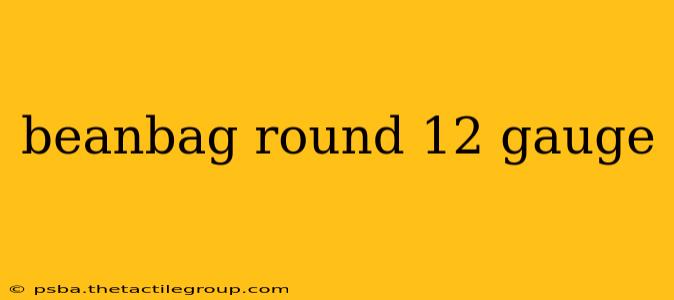The world of shotgun ammunition is vast, encompassing various shot sizes, shell lengths, and specialized rounds. Among these, the beanbag round for a 12-gauge shotgun stands out for its unique application and characteristics. This guide delves into the specifics of beanbag rounds, their functionality, legal considerations, and safety precautions.
What is a Beanbag Round?
A beanbag round, or beanbag shotgun shell, is a less-lethal munition designed for close-range engagements. Unlike traditional shotgun rounds filled with lead or steel shot, beanbag rounds contain a fabric bag filled with a material like lead shot, small plastic pellets, or even dried beans (hence the name). This design delivers a significant impact upon contact, incapacitating a target without causing the same level of penetrating trauma as conventional ammunition.
Advantages of Beanbag Rounds
- Reduced Penetration: The primary advantage is the reduced penetration capacity compared to traditional shot. This minimizes the risk of over-penetration and injury to unintended targets beyond the primary subject.
- Less-Lethal Force: Beanbag rounds are designed to incapacitate, primarily through blunt force trauma, making them ideal for situations where lethal force is not warranted. Law enforcement and security personnel frequently employ them.
- Control and Accuracy: While spread is still a factor, beanbag rounds offer improved accuracy compared to buckshot or birdshot at short ranges.
Disadvantages of Beanbag Rounds
- Limited Range: Their effectiveness significantly diminishes with distance. They are designed for close-range use only.
- Potential for Injury: Although less lethal, beanbag rounds can still cause serious injury or death, especially at close range or if impacting vulnerable areas of the body. Improper use can result in significant harm.
- Legal Restrictions: The use of beanbag rounds is subject to legal restrictions and regulations, varying by jurisdiction. Understanding and adhering to local and national laws is crucial.
Applications of Beanbag 12 Gauge Rounds
Beanbag rounds find applications in various sectors, notably:
- Law Enforcement: Used for crowd control, subduing suspects, and resolving high-risk situations where lethal force is inappropriate.
- Security Personnel: Private security firms may use them to deter or incapacitate intruders.
- Home Defense (with Caution): While some use them for home defense, it's critical to weigh the potential for injury and legal ramifications. Proper training and awareness of local laws are absolutely essential.
Legal Considerations and Safety Precautions
The use of beanbag rounds is strictly regulated. Before considering their use, consult legal counsel and ensure complete compliance with all applicable federal, state, and local laws. Improper use can lead to severe legal consequences.
Crucial Safety Precautions:
- Training: Always receive professional training before using any less-lethal munition. This training should cover safe handling, aiming techniques, and the potential risks associated with their use.
- Appropriate Range: Only use beanbag rounds at extremely close range. Their effectiveness drops drastically with distance.
- Target Selection: Carefully assess the target and surrounding environment before firing. Minimize the risk of collateral damage.
- Storage: Store beanbag rounds properly, ensuring they are kept dry and protected from damage.
Conclusion
Beanbag rounds represent a specialized type of ammunition offering a less-lethal option compared to conventional shotgun rounds. However, their use necessitates careful consideration of legal ramifications, safety precautions, and appropriate training. Always prioritize safety and responsible use when handling any firearm, and especially when using specialized ammunition like beanbag rounds. Remember to always consult local laws and regulations before using beanbag rounds.

